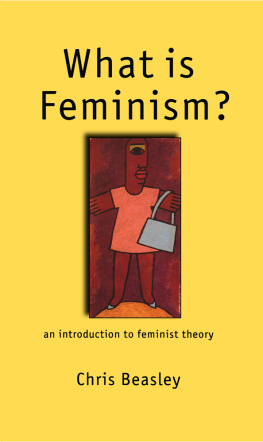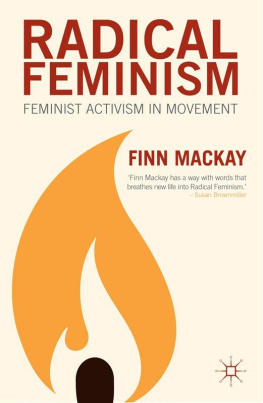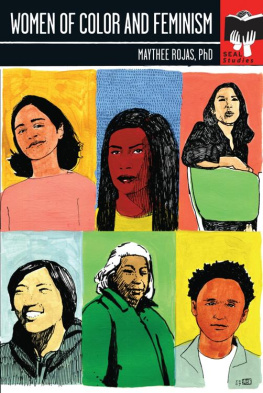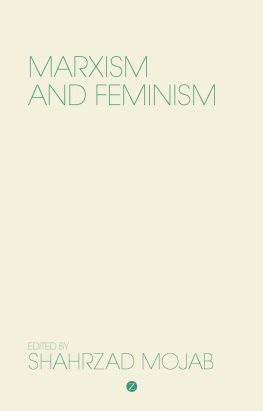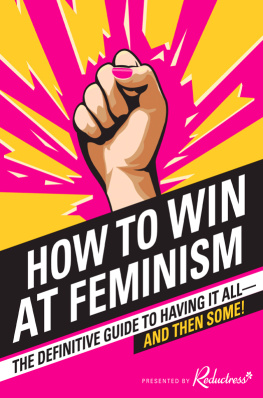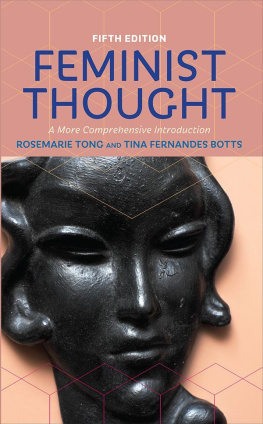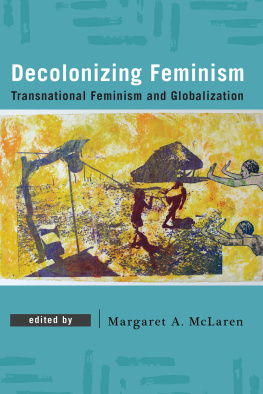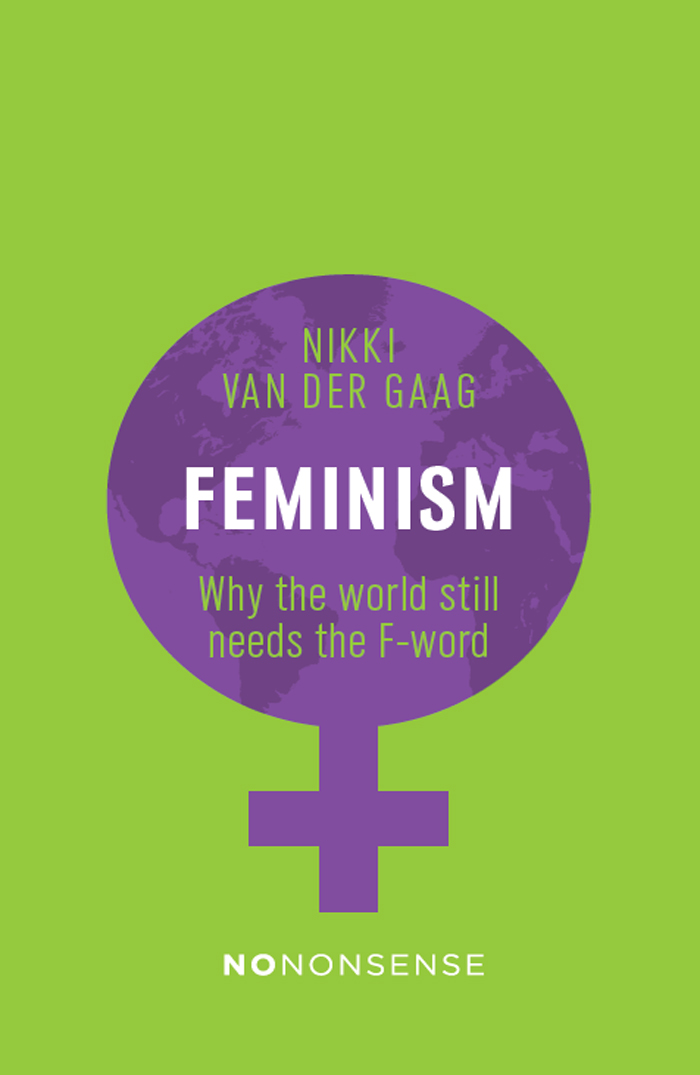
About the author
Nikki van der Gaag has been an independent consultant working on gender in development, with a particular focus on girls and on men and gender equality, since 2002. She is the author of Feminism and men (Zed Books, 2014) and the No-nonsense Guide to Womens Rights (New Internationalist, 2008) and co-author of the State of the Worlds Fathers (MenCare, 2015) as well as principal author of many of Plan Internationals State of the Worlds Girls reports. She is a former editor at New Internationalist and is Director of Gender Justice and Womens Rights at Oxfam GB. This book was written in a personal capacity.
To Rosa and the next generations of feminists.
About the New Internationalist
New Internationalist is an award-winning, independent media co-operative. Our aim is to inform, inspire and empower people to build a fairer, more sustainable planet.
We publish a global justice magazine and a range of books, both distributed worldwide. We have a vibrant online presence and run ethical online shops for our customers and other organizations.
Independent media: were free to tell it like it is our only obligation is to our readers and the subjects we cover.
Fresh perspectives: our in-depth reporting and analysis provide keen insights, alternative perspectives and positive solutions for todays critical global justice issues.
Global grassroots voices: we actively seek out and work with grassroots writers, bloggers and activists across the globe, enabling unreported (and under-reported) stories to be heard.


Feminism
Why the world still needs the F-word
Published in 2017 by
New Internationalist Publications Ltd
The Old Music Hall
106-108 Cowley Road
Oxford OX4 1JE, UK
newint.org
Nikki van der Gaag
The right of Nikki van der Gaag to be identified as the author of this work has been asserted in accordance with the Copyright, Designs and Patents Act 1998.
All rights reserved. No part of this book may be reproduced, stored in a retrieval system or transmitted, in any form or by any means, electronic, electrostatic, magnetic tape, mechanical, photocopying, recording or otherwise, without prior permission in writing of the Publisher.
Cover design: Ian Nixon
Design concept: Andrew Smith, asmithcompany.co.uk
Series editor: Chris Brazier
Series design by Juha Sorsa

British Library Cataloguing-in-Publication Data.
A catalogue record for this book is available from the British Library.
Library of Congress Cataloging-in-Publication Data.
A catalog for this book is available from the Library of Congress.
(ISBN ebook 978-1-78026-328-1)
Table of Contents
Guide
Contents
Growing up in Uganda in the 1960s, I was my fathers daughter. I admired him very much, and people said I was like him. I had a more difficult relationship with my mother, but as I grew older and reflected on who I am and why I believe the things that I believe, I found myself coming back to my mother and my grandmother. I identified deeply with the struggles they went through, and how their struggles made them who they were so that they could also shape me.
My mother left her teaching job to raise us and became a community leader. She built networks with women in the village, and started village womens clubs. When I was growing up, the majority of women had no formal education at all. So they learnt how to read and write through those clubs, they learnt about homemaking, childcare, sanitation and hygiene, nutrition, income generation, important life skills. The womens movement in Uganda grew from these roots.
Many years later, when I was contesting a seat in parliament, I used to recall something an uncle had said to me: Winnie, I have one child and three miserable girls. In his mind, the girls were not counted as his children. Whenever I shared this on the campaign trail, the women would all start shaking their heads and I would begin to discuss gender issues with them.
Today, women are still talking about their rights, or lack of them. They are also still taking action, in myriad ways and across the globe.
Feminism was once a dirty word, rejected even by some womens rights activists; now, it is being adopted by a new generation that can see both the gains made by their elders and the threats to this progress be it from poverty, economic inequality, religious fanaticism or climate change.
Our world seems much smaller in the 21st century, with new media and digital innovation proving useful tools in campaigning and raising awareness. But many of the threats to womens rights remain the same as they were for my mother and grandmother: a patriarchal society that values men, and boys education, above women and girls, in which women do menial jobs for minimum pay and face domestic violence, and in which they are silenced if they dare to speak out.
In 2015, gender equality was enshrined in the Sustainable Development Goals, as well as in the review of agreements seminal to womens rights, including the Beijing Platform for Action and UN Security Resolution 1325. There is a greater understanding that improving the state of the worlds women will improve mens lives, too, and more girls across the globe are completing primary education, at least. There are more women role models in politics, in sport, in the arts, and beyond. There is more awareness that feminism and womens rights embrace other rights and struggles, including disability, race and sexuality.
Highlighted in this informative and concise guide to feminism by Nikki van der Gaag are many individuals and groups doing incredible outreach and campaigning work, often at significant personal risk. Let us take inspiration from them and join them in creating a fairer, more feminist 21st century.
Winnie Byanyima
Executive Director, Oxfam International
I cant quite believe how many books on feminism I have managed to accumulate over the course of more than 20 years of working on womens rights. The piles are so high on my desk that they block the view out of my office and they keep toppling over. Some date back to my teenage years, some were published just this month. And I wonder why I am writing another one
But then I look at them again and I remember my younger self and how inspired I was by those who had gone before me Alice Walker and Nawal el Saadawi and Germaine Greer and Betty Friedan and Maya Angelou and Dale Spender and Juliet Mitchell and Susan Faludi and Lynne Segal and Urvashi Butalia. I remember all the amazing women and girls in different parts of the world who shared their ideas and their stories, often harrowing ones, with me, and asked me to share them with the world.
I also remember how difficult it was to be out as a feminist in the doldrums of the post-feminist 1990s, when I was juggling children and a job and my partner was the only man in his office who took a day off just to be with our children.


